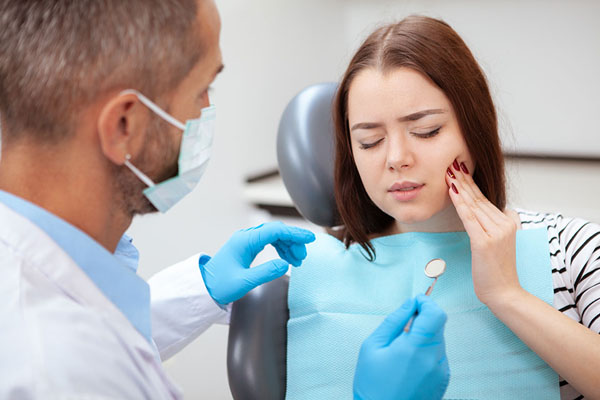You Don’t Have to Live With Jaw Pain
If you struggle with chronic jaw pain, you know how debilitating it can be. However, there are various treatment options for those with temporomandibular joint disorders. If you suspect you’re living with a TMJ disorder (TMD), contact our dentist today. We’ll evaluate your health and recommend the best course of action.
Get started today by contacting our Sacramento dental office at (916) 929-9222.

What Is Internal Joint Derangement?
Internal joint derangement (IJD) is a TMJ condition where the structures within a joint, such as ligaments, tendons, cartilage, or menisci, are damaged or displaced. It’s caused by injury, overuse, or degenerative changes in the joint.
Types of Internal Joint Derangement
There are two types of internal joint derangement:
- Disc Displacement With Reduction: This type of IJD occurs when the disc in the TMJ shifts out of its normal position but returns to its proper place when the jaw is closed or opened. It’s often associated with clicking or popping sounds in the jaw joint and may cause mild pain or discomfort.
- Disc Displacement Without Reduction: This type of IJD occurs when the disc in the TMJ shifts out of its normal position and doesn’t return to its proper place. It’s often associated with significant pain and discomfort. It may also cause restricted jaw movement, locking of the jaw joint, and difficulty with chewing and speaking.
Causes of Internal Joint Derangement
Various factors can cause IJD, including:
- Trauma to the jaw joint
- Arthritis
- Misaligned bite
- Excessive teeth grinding or clenching
Internal Joint Derangement Symptoms
Symptoms of internal joint derangement can vary depending on the severity of the condition. Some common symptoms include:
- Pain in the jaw joint or surrounding muscles
- Clicking or popping sounds when opening or closing the mouth
- Difficulty or discomfort when opening the mouth
- Locking of the jaw joint
- Headaches
- Earaches
- Tinnitus (ringing in the ears)
If you suspect you have IJD or a similar type of TMJ disorder, don’t wait to seek treatment. Call our dental office at (916) 929-9222 today to schedule a consultation with our Sacramento dentist.
Treatments for Internal Joint Derangement
Treatment for IJD will depend on the severity of the condition and the underlying cause. In mild cases, conservative treatments such as pain management, physical therapy, and lifestyle modifications may be effective in relieving symptoms.
Pain management options can include:
- Over-the-counter pain relievers
- Prescription medications
- Injections of corticosteroids or other anti-inflammatory drugs
Physical therapy may include exercises to improve jaw strength and flexibility and techniques to help reduce muscle tension and promote relaxation. Lifestyle modifications can include changes to the diet, as well as avoiding behaviors that can aggravate the condition.
In more severe cases, surgery may be necessary to correct the underlying problem. Surgery can involve repairing or removing the displaced disc, realigning the jaw joint, or replacing the joint entirely with an artificial joint.
Who Develops Internal Joint Derangement?
Internal joint derangement can occur in anyone, regardless of age or gender. However, certain factors can increase the risk of developing the condition, such as:
- History of trauma to the jaw joint
- Misaligned bite
- History of arthritis
- Excessive teeth grinding or clenching
Frequently Asked Questions
How is internal joint derangement diagnosed?
Diagnosis of internal joint derangement typically involves a comprehensive medical history review, physical examination, and imaging tests such as X-rays, MRI, or CT scans. The doctor may also perform a joint aspiration, which involves inserting a needle into the joint to remove and analyze fluid.
Can internal joint derangement affect other parts of the body?
While internal joint derangement primarily affects the temporomandibular joint, it can also cause referred pain in other areas of the head and neck, such as the ears, cheeks, and temples. In some cases, it can also lead to headaches, neck pain, and facial muscle spasms.
How common is internal joint derangement?
Internal joint derangement is a relatively common condition, mostly seen in people between the ages of 20 and 50, and is more frequent in women than men. However, it can affect individuals of all ages, including children. The incidence of internal joint derangement may be increasing due to factors such as stress, poor diet, and lack of physical activity.
Can internal joint derangement be prevented?
Preventing internal joint derangement can be challenging, but some measures can reduce the risk of developing the condition. These include practicing good posture, avoiding chewing gum and other hard or chewy foods, and reducing stress. It’s also wise to seek prompt treatment for jaw or facial injuries.
Find Relief for Internal Joint Derangement Symptoms
If you’re experiencing symptoms of internal joint derangement, such as jaw pain, clicking or popping sounds, or difficulty opening or closing your mouth, it’s best to seek medical attention from a qualified healthcare professional. They can examine your jaw and recommend appropriate treatment options to alleviate your symptoms and improve your quality of life.
Don’t wait until your symptoms worsen. Schedule an appointment today by calling our Sacramento dental office at (916) 929-9222.

